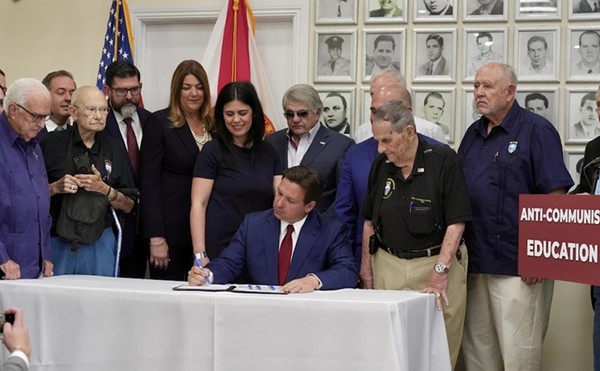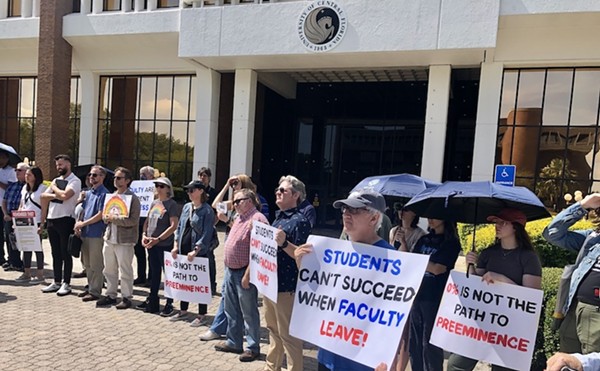This week in the afterthought masterpiece theater chambers – the regular City Council meeting started late because of some nonsense about the newly proposed city budget making us The Best City In All of Citydom – the typical drama was hard to find. A pre-meeting press huddle forced the mayor into a vat of clichés delivered in standard robotic tones (“I think everybody’s focused on job creation. We don’t really create the jobs,” he short circuited before morphing into Gov. Rick Scott). Only Commissioner Daisy Lynum drifted from the party line (“We must have some responsibility,” she wondered aloud with all due impotence), and that’s just because she was unexpectedly caught up in a Government Sucks for Not Creating Jobs rally in Pennsylvania recently. If our government sucks, our government is not about to tell us that, right?
Item:The city approves the proposed fiscal year 2011-2012 city millage rate of 5.6500, and approves the Downtown Development Board millage rate of 1.0000.
Translation: Like most of the fiduciary morsels that season our city-politics gumbo, the prospect of discussing millage rates – or, property taxes as parsed through a calculator intended to complicate rather than solve a problem – is a daunting, if vaguely political, affair. As always, the unsinkable, unthinkable Mayor Buddy Dyer has been riding high on his “no new taxes” chariot, smiling his way through the prelude to the pending fiscal budget morass in September. This item, simply put, will hold the city’s standard millage at a mere 5.65, a rate that is expected to bring in $98.7 million, which is a few million less than the same rate in last year’s budget and, gulp, more than $20 million less than the year before. For the sake of shiny comparison, the city has turned public attention to other flagging municipal economies – issuing a handout earlier this month that included headlines from other local papers about how dire everything is elsewhere (budget shortfalls! Raided reserves! Anarchy!) – to illustrate that the city’s 5.65 sweet spot has made us a much better burg than, say, Miami (7.6740 millage) or Tampa (5.7326 millage). So what’s the balancing point? Well, if the mayor’s own political Facebook account is to be believed, it’s not very nice. “Did you know that over the past few years, the city has reduced its workforce by 400 while protecting police and firefighters?” read Dyer’s status update on July 20. “Did you know that actually means 400 fewer jobs?” we frowned. The controversial post has since been removed. Regardless, the city claims that because of its rather sharp employment clippers at characteristic frugality (see: the Amway Center and the still-to-come performing arts center), there won’t be any need for those kinds of tough measures this time around. Meanwhile, the Downtown Development Board millage – which is tied to the Community Redevelopment Agency bordering the Orange Avenue core – will be capped at its legal maximum of 1.0000, an amount expected to raise $1.8 million, or about what the city lost on the Amway Center in its first six months of operation. Everything is fine.
Item: The city approves an agreement between the Dr. Phillips Center for the Performing Arts and Universal Engineering Sciences Inc. to provide threshold inspection services for the Dr. Phillips Center.
Translation: Thanks to Florida statutory regulations, the forthcoming music hall designed to save Orlando’s arts community by effectively killing it is considered a “threshold” building. Basically, that’s development-speak for a structure that is both tall and wide and therefore in need of a special set of eyes to watch out for things like “pouring concrete in the rain” and wayward rebar. The folks at DPAC, who are like second cousins of the city but can still sleep with it without fear of retribution or three-eyed babies, have negotiated a lump sum payout of $806,000 to Universal Engineering Services just to make sure things don’t get messy. In related hypothetical construction news, the city (or DPAC, rather) will also dole out $1.4 million to Nodarse & Associates for that company’s abundant skills at testing construction materials (plus $15,000 in reimbursable expenses). Things fall apart.
Item: The city approves a professional services authorization with Kittelson & Associates Inc. for a real-time parking availability study and demonstration.
Translation: Now that we’ve moved beyond the year-old sting of the city effectively doubling parking rates downtown to, you know, shore up the budget and make the new venues more attractive and accessible, the city will tap its favorite transportation engineers at KAI for a study to make that still-unavailable parking more manageable. The hope is that by spending $65,000 the city can ascertain just where there are parking spaces, thereby saving four-wheeled consumers time driving in circles and “cruising” for spaces to stop. It’s a “real-time” parking philosophy that could someday mean that the city’s new “wayfinding” systems could be tied to a phone app to help locate vacancies just long enough for someone else to take that parking space you really, really wanted ... or, for you to get in a wreck. Of course, it will all be for naught if KAI decides that the project would cost more than $2 million to install. The “incremental improvement in air quality” that the city is anticipating from this measure (while simultaneously sniffing glue) may just have to wait.


















